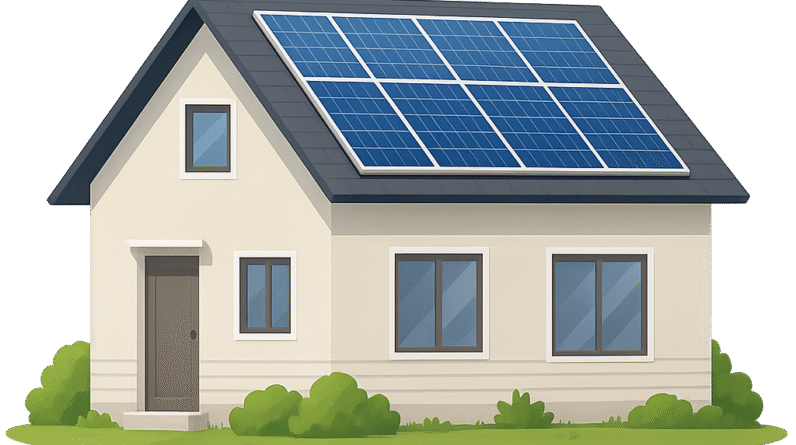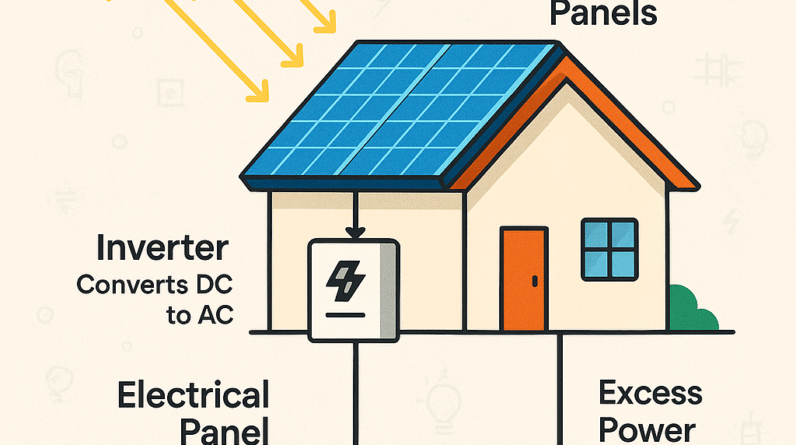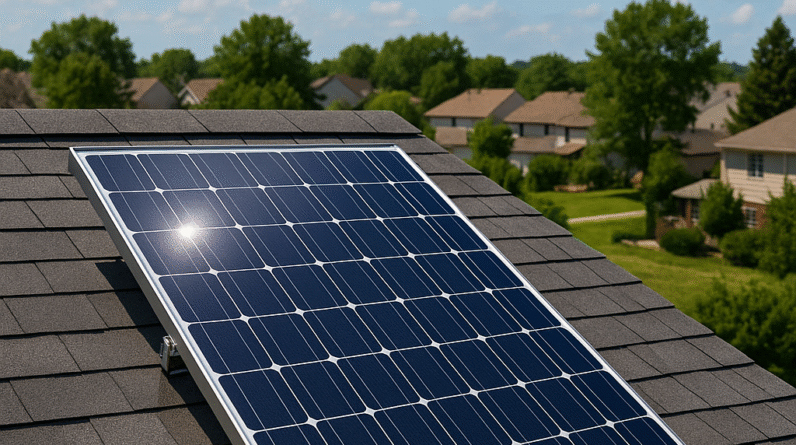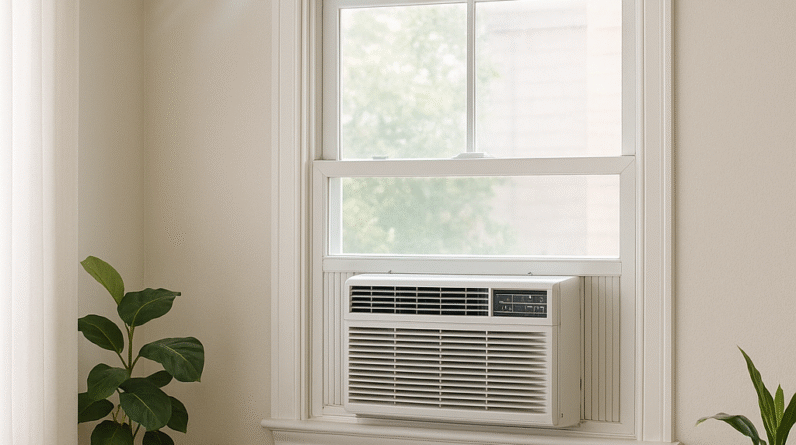
Can Solar Power Run An Air Conditioner?
Can Solar Power Run An Air Conditioner? Imagine enjoying a cool, refreshing breeze on a scorching summer day, all powered by the sun’s rays. It might sound like a dream, but the question remains: Can solar power effectively run an air conditioner? In this article, we will explore the possibility of utilizing solar energy to keep our homes cool and comfortable, debunking any doubts that may arise along the way. So, sit back, relax, and let’s uncover the truth behind the potential of solar-powered air conditioning.
1. Overview of Solar Power and Air Conditioners
What is solar power?
Solar power refers to the renewable energy generated from sunlight. It harnesses the sun’s energy and converts it into electricity, which can be used to power various appliances and devices.
How does solar power work?
Solar power works through photovoltaic (PV) cells, which are commonly found in solar panels. These cells consist of layers of semiconducting material that absorb sunlight and convert it into direct current (DC) electricity. The DC electricity is then converted into alternating current (AC) electricity, which can be used to power air conditioners and other electrical equipment.
What is an air conditioner?
An air conditioner is a device that aims to regulate and control the temperature and humidity of an indoor space. It works by removing heat and moisture from the air, providing cool and comfortable conditions in hot weather.
How does an air conditioner work?
An air conditioner uses a refrigeration cycle to cool the air. It consists of a compressor, condenser, expansion valve, and evaporator. The refrigerant absorbs heat from the indoor air, which is then transferred to the outdoor unit where it is released. The cooled air is then blown back into the room, creating a comfortable environment.
2. Solar Power Generation and Energy Requirement of Air Conditioners
Solar power generation capacity
The capacity of solar power generation depends on various factors such as the size of the solar panel array, the location’s solar radiation, and the efficiency of the panels. By installing a sufficient number of solar panels, it is possible to generate enough electricity to power air conditioners.
Energy requirement of different types of air conditioners
The energy requirement of air conditioners varies depending on their size, cooling capacity, and energy efficiency rating. Central air conditioners, for example, typically require more energy compared to smaller window or split air conditioning units. It is important to consider the energy consumption of the air conditioner to determine the solar power system needed.
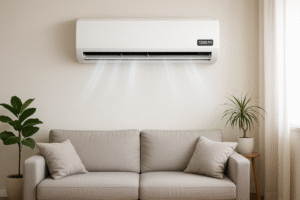
3. Factors Affecting the Feasibility of Running an Air Conditioner on Solar Power
Location and solar radiation
The amount of sunlight received in a specific location affects the feasibility of running an air conditioner on solar power. Areas with high solar radiation are more suitable for solar power generation, as they can generate more electricity to meet the energy demands of the air conditioner.
Size and efficiency of solar panels
The size and efficiency of solar panels play a crucial role in determining the viability of running an air conditioner on solar power. Larger panels can generate more electricity, while higher efficiency panels can convert a greater percentage of sunlight into usable energy.
Battery storage capacity
Battery storage systems are used to store excess solar energy for later use, especially during periods of low sunlight or nighttime. The capacity of the battery storage system must be adequate to store enough energy to power the air conditioner for the required duration.
Efficiency of the air conditioner
The efficiency of the air conditioner itself is an important factor to consider. More efficient air conditioners require less energy to operate, making them more compatible with solar power systems.
4. Calculating Energy Consumption and Solar Power Generation
Determining the energy consumption of the air conditioner
To calculate the energy consumption of an air conditioner, one needs to consider the cooling capacity (measured in British Thermal Units or BTUs) and the operating hours. The energy consumption can be determined by multiplying the cooling capacity by the hours of operation and the unit’s energy efficiency ratio (EER).
Estimating solar power generation
The estimation of solar power generation involves considering factors such as the size and efficiency of the solar panel array, location, and solar radiation. By analyzing these variables, it is possible to estimate the amount of electricity that can be generated by the solar power system.
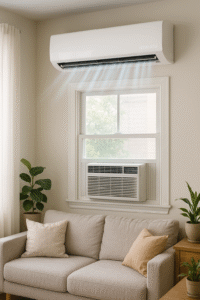
5. Solar Power System Setup for Running an Air Conditioner
Sizing the solar panel array
Sizing the solar panel array involves determining the number and capacity of solar panels required to generate enough electricity to power the air conditioner. Factors like energy consumption, location, available space, and the efficiency of the panels need to be considered in order to achieve optimal results.
Inverter and battery selection
Inverters are essential components that convert the DC electricity generated by the solar panels into AC electricity, which is compatible with air conditioners and other electrical appliances. Battery selection is also important to store excess energy for future use, ensuring continuous operation even when sunlight is limited.
Backup power options
In case of extended periods of low sunlight or system failures, it is crucial to have backup power options. These can include grid connection, diesel generators, or other alternative sources of electricity to ensure uninterrupted air conditioner operation.
Wiring and electrical connections
Proper wiring and electrical connections are essential for a safe and efficient solar power system setup. It is important to follow electrical codes and regulations to ensure proper installation and minimize the risk of accidents or damage.
6. Case Studies: Successful Implementation of Solar-Powered Air Conditioners
Residential installations
Many homeowners have successfully implemented solar-powered air conditioners. By carefully selecting the appropriate solar power system and optimizing energy consumption, they have reduced their reliance on traditional electricity sources, resulting in significant cost savings and a greener lifestyle.
Commercial installations
Several businesses and commercial buildings have also embraced solar power for air conditioning. Large-scale solar installations have been utilized to power multiple air conditioning units, reducing operating costs and promoting environmental sustainability.
Off-grid applications
In off-grid locations or areas with limited access to electricity, solar-powered air conditioners can be a game-changer. Solar energy provides an independent and reliable source of power, enabling air conditioning in remote locations, mobile homes, and areas with unreliable power grids.

This image is property of images.unsplash.com.
7. Challenges and Limitations of Running an Air Conditioner on Solar Power
High upfront costs
The initial costs of installing a solar power system for air conditioning can be substantial. However, it is important to consider the long-term cost savings and environmental benefits that outweigh the upfront investment.
Limited availability of sunlight
Areas with low solar radiation or frequent cloudy weather may face challenges in generating enough solar energy to power air conditioners consistently. This limitation must be considered when determining the feasibility of running an air conditioner on solar power.
System inefficiencies and maintenance
Efficiency losses in the solar power system, such as shading, dust accumulation, or aging panels, can reduce overall energy generation. Regular maintenance and monitoring are necessary to address these issues promptly and ensure optimal system performance.
8. Advantages of Using Solar Power for Air Conditioning
Reduced electricity bills and long-term cost savings
By relying on solar power for air conditioning, homeowners and businesses can significantly reduce their electricity bills. The initial investment in solar panels pays off over time through lower energy costs, resulting in long-term cost savings.
Environmental benefits and reduced carbon footprint
Solar power is a clean and renewable energy source, contributing to a reduction in greenhouse gas emissions and promoting environmental sustainability. By using solar power for air conditioning, individuals and organizations can minimize their carbon footprint and support a greener future.
Energy independence and grid resilience
Solar-powered air conditioning offers energy independence, decreasing reliance on traditional power grids and mitigating the impacts of power outages. This resilience ensures continuous comfort and operation, even during emergencies or grid failures.
9. Tips for Optimizing Solar-Powered Air Conditioning
Proper insulation and energy-efficient building design
Optimizing the energy efficiency of the building, such as insulation, window shading, and energy-efficient appliances, can reduce the energy demand of the air conditioner. These measures maximize the benefits of solar power and minimize overall energy consumption.
Gaining maximum benefit from solar energy production
To gain the maximum benefit from solar energy production, it is crucial to align air conditioner usage with peak sunlight hours. By synchronizing energy demand with solar power generation, individuals can maximize the utilization of the generated electricity.
Using smart thermostats and scheduling features
Smart thermostats and scheduling features enable precise control of air conditioner operation, allowing users to optimize energy consumption. By programming the system to adjust temperatures based on occupancy or time of day, energy wastage can be minimized.
10. Conclusion
Viability of running an air conditioner on solar power
Running an air conditioner on solar power is not only achievable but also increasingly popular. With advancements in solar technology and greater awareness of environmental sustainability, more homeowners and businesses are embracing solar-powered air conditioning as a viable and efficient solution.
Future prospects and advancements
The future of solar-powered air conditioning looks promising, with ongoing advancements in solar technology, battery storage systems, and energy-efficient air conditioner designs. As solar power becomes more accessible and affordable, the possibilities for running air conditioners on solar power will continue to expand, benefitting individuals, communities, and the environment alike.


